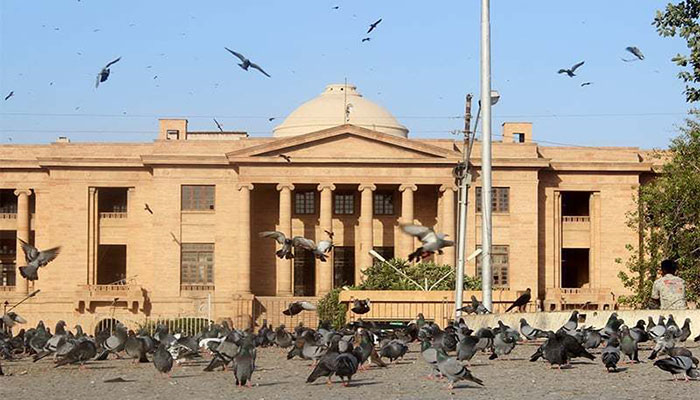Committee formed for medico-legal reforms, SHC told
The health department has constituted a 15- member committee for medico-legal reforms to improve the medico-legal system in the province, a health department official told the Sindh High Court on Tuesday.
Filing a statement on behalf of the health secretary on a petition seeking the abolition of the virginity test in rape cases, Dr Fazi Mangi said some members of the committee had submitted their proposals for making improvement in the system. To a court query, he submitted that the committee, constituted on October 19, had not yet convened any meeting.
The head of the committee, Prof Dr Farhat Hussain Mirza and additional police surgeon Dr Sumaiya Syed, who is also on the committee, said they had given a proposal for making some improvements in the medico-legal system through some reforms. They said a meeting of the committee could not be held as they had no secretarial facility.
Health department official submitted that a meeting could be convened if the chairman mentioned a date 10 days in advance and it was communicated to all members to ensure their presence at the meeting.
The additional police surgeon proposed that a virtual meeting could be convened as it was not possible to hold a physical meeting due to the second wave of Covid-19. A division bench headed by Justice Mohammad Ali Mazhar directed the health department official to supply a copy of the working papers/proposals to all members of the committee prior to convening a meeting so that the members could examine the papers and propose changes if deemed fit.
The court directed the health department to submit by December 12 the final standard operative procedure to be decided by the meeting. The petitioners, Natasha Ali, said medico-legal officers (MLOs) perform hymen tests and two-finger tests as part of the medical evaluation of sexual assault victims, adding that such tests are unreliable, unnecessary and without any scientific basis.
They said the people accused of having committed rape are mostly acquitted either for want of evidence or on unsubstantiated suggestions of victims being promiscuous or immoral in conduct. They contended that these standards defy the constitutional liberties vesting in and with all citizens, including victims of sexual assaults. The petitioners also said that other nations of the subcontinent have outlawed such practices as being unlawful and in violation of basic human rights, and that there is a need for judicial intervention premised on similar standards.
The petitioners said the government had made amendments in the criminal procedure law making DNA tests in sexual assault cases mandatory, and that the superior courts have also ordered that DNA tests be conducted in all rape cases.
They said that despite the significance of the courts’ decision in highlighting the role of DNA evidence, a large-scale shift among investigating officers and their attitude towards the collection of DNA evidence in all sexual offences is yet to be observed. It has been reported in the media that Sindh is ill-equipped as regards the availability of qualified MLOs, and this insufficiency has demonstrated further dwindling numbers in so far as female MLOs are concerned, they added.
They noted that there are reportedly only four female MLOs in Karachi. They requested the court to direct the home and health departments to stop two-finger tests in rape cases, and to ensure the implementation of DNA tests and the standard operating procedures germane to ensure good medical practice as regards medical examinations, investigations and criminal prosecution of allegations in sexual assaults cases. They also sought appointments of qualified female MLOs duly accredited with modern medical practices.
-
 James Van Der Beek Loved Ones Breaks Silence Fundraiser Hits $2.2M
James Van Der Beek Loved Ones Breaks Silence Fundraiser Hits $2.2M -
 Disney’s $336m 'Snow White' Remake Ends With $170m Box Office Loss: Report
Disney’s $336m 'Snow White' Remake Ends With $170m Box Office Loss: Report -
 Premiere Date Of 'Spider-Noir' Featuring Nicolas Cage Announced
Premiere Date Of 'Spider-Noir' Featuring Nicolas Cage Announced -
 Pedro Pascal's Sister Reveals His Reaction To Her 'The Beauty' Role
Pedro Pascal's Sister Reveals His Reaction To Her 'The Beauty' Role -
 Kate Middleton Proves She's True 'children's Princess' With THIS Move
Kate Middleton Proves She's True 'children's Princess' With THIS Move -
 Paul Anka Reveals How He Raised Son Ethan Differently From His Daughters
Paul Anka Reveals How He Raised Son Ethan Differently From His Daughters -
 'A Very Special Visitor' Meets Queen Camilla At Clarence House
'A Very Special Visitor' Meets Queen Camilla At Clarence House -
 Jodie Turner Smith Shares One Strict Rule She Follows As A Mom
Jodie Turner Smith Shares One Strict Rule She Follows As A Mom -
 Hailey Bieber Reveals KEY To Balancing Motherhood With Career
Hailey Bieber Reveals KEY To Balancing Motherhood With Career -
 Photo Of Jay-Z, Other Prominent Figures With Jeffrey Epstein Proven To Be Fake
Photo Of Jay-Z, Other Prominent Figures With Jeffrey Epstein Proven To Be Fake -
 Hillary Clinton's Munich Train Video Sparks Conspiracy Theories
Hillary Clinton's Munich Train Video Sparks Conspiracy Theories -
 Fans Slam Talk Show Host For 'cringe' Behavior In Chris Hemsworth Interview
Fans Slam Talk Show Host For 'cringe' Behavior In Chris Hemsworth Interview -
 Woman Jailed Over False 'crime In Space' Claim Against NASA Astronaut
Woman Jailed Over False 'crime In Space' Claim Against NASA Astronaut -
 James Van Der Beek’s Close Pal Reveals Family's Dire Need Of Donations
James Van Der Beek’s Close Pal Reveals Family's Dire Need Of Donations -
 Prince William And Harry's Cousins Attend 'Wuthering Heights' Event
Prince William And Harry's Cousins Attend 'Wuthering Heights' Event -
 Hailey Bieber Turns Heads Just Hours After Major Business Win
Hailey Bieber Turns Heads Just Hours After Major Business Win




